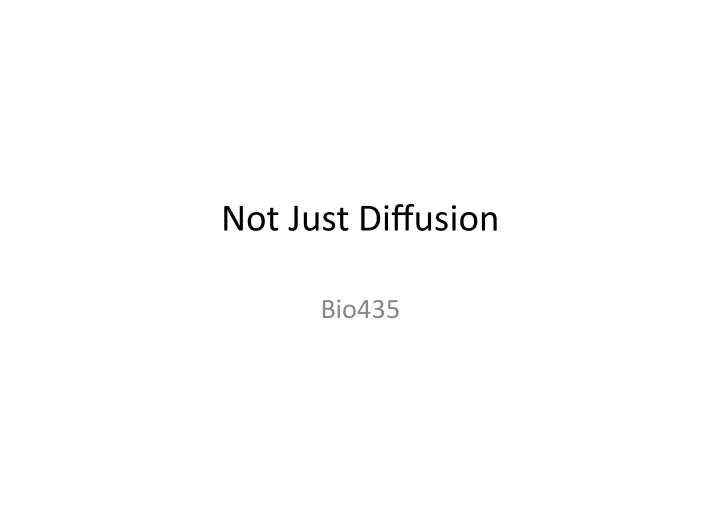

Not Just Diffusion Bio435
Diffusion with Dri3
Mean and Variance Mean Total steps N=t/ Δ t Displacement Δ x i , i=1,2,…N Total displacement Δ x tot = Δ x 1 + Δ x 2 +… Δ x N < Δ x>=a*k + Δ t + (‐a)*k ‐ Δ t + (0)*(1‐k + Δ tk ‐ Δ t) = a(k + ‐k ‐ ) Δ t Variance (avg. sq. displacement) var< Δ x 2 >=a 2 *k + Δ t + (‐a) 2 *k ‐ Δ t ‐ < Δ x 2 >= 2a 2 (k + +k ‐ ) Δ t Since k ± Δ t<<1 and < Δ x 2 ><<<
Velocity v = Δ x ( ) Δ t = a k + − k − For low Reynold’s Numbers F = γ v γ = FricVonal coefficient p(x, t+ Δ t) = … + D ∂ 2 p ( x , t ) ∂ p ( x , t ) = − v ∂ p ( x , t ) ∂ x 2 ∂ t ∂ x Dri3 velocity v = a(k + ‐ k ‐ ) Diffusion coefficient D= (k + + k ‐ )a 2 /2
Einstein RelaVon: Macroscopic
Einstein‐Smoluchowski RelaVon D = k B T 6 πη r Einstein, A. (1905), "Über die von der molekularkineVschen Theorie der Wärme geforderte Bewegung von in ruhenden Flüssigkeiten suspendierten Teilchen", Annalen der Physik 17: 549–560 Smoluchowski, M. (1906), "Zur kineVschen Theorie der Brownschen Molekularbewegung und der Suspensionen", Annalen der Physik 21: 756–780
Monomer Diffusion to Capture by Polymer
ChemorecepVon as Diffusion to Capture
Ligand ConcentraVon Profile
Uptake Rate of Ligand of Perfect Receptor a=radius of spherical cell c 0 =far field concentraVon D=diffusion coefficient dn dt = 4 π Dac 0
Uptake Rate of Ligand with Imperfect Receptor a=radius of spherical cell c 0 =far field concentraVon D=diffusion coefficient k on = finite absorpVon rate of receptor M = no. of surface bound receptors dn dt = Mk on c ( a )
For Imperfect Receptors c 0 At the cell surface c ( a ) = ( ) 1 + Mk on 4 π Da Mk on 4 π Da >> 1 When c(a)=0 When c(a)=c 0 Mk on 4 π Da << 1
ImplicaVons When receptor number increased, nothing added to absorb ligands What is minimal receptor number to mimic perfectly absorbing surface? Solving dn c 0 dt = M ( ) 1 + Mk on 4 π Da M = 4 π Da k on
FRAP: Measuring GFP mobility in E. coli
Principle • Prebleach image • Bleach • Postbleach image series
PreparaVons • Collect 10 ml sterile LB tubes from CA • Bacteria E. coli K12 with pGFP ampicillin resistant • Grow in 50 ug/ml Ampicillin (stock 100 ug/ml) • Monitor O.D.600nm • At OD=0.6, add final conc. 100 uM IPTG to induce overexpression of GFP (stock 100 mM) • Use cephalexin to lengthen cells 20 min before removing culture
E. Coli K12 with pGFP
Analysis Alignment of the images (only necessary if the regions of interest moved over Vme). 1. Fluorescence intensity quanVficaVon (obtaining the raw data) 2. Background subtracVon 3. CorrecVons due to laser fluctuaVons, photobleaching during acquisiVon (postbleach) and total fluorescence loss caused by the bleaching step 4. NormalizaVon 5. Mobile/immobile fracVon 6. T½ hal3ime of the equilibraVon of bleached and unbleached molecules 7. TheoreVcal models to addiVonally determine binding characterisVcs of the analysed molecule I N = I T I I
Recovery Profile
Measure • Bleached area • Unbleached area • Neighbouring cell • Background (no cell)
Data Fiwng C 0 =depth of bleach at Vme t=0 R 0 =IniVal half‐width of 2 + 8 Dt bleach C = C 0 ⋅ R 0 R 0 D=diffusion coefficient t=Vme point
ObservaVons and Results • Diffusion coefficient • Mobile fracVon • TheoreVcal diffusion coefficient of GFP • Error bars • Intrinsic bleach rate • Other model fits to experiment
NEXT • Assignment 3: diffusion to capture • FRAP experiment 16‐March – 17 th March culture E. coli GFP – 18 th March microscope in 6 batches – 18 th March onwards: data analysis – 24 th March discuss results • Crowding • Cytoskeletal dynamics • Molecular Motors and their dynamics
Assignment: How Many Receptors? EukaryoVc cell a~10 µ m 2 D = 100 µ m 2 /s k on ~ 10 µ M ‐1 s ‐1 (acVn or ParM polymerizaVon rate) Convert k on into µ m ‐3 M = ? Spacing?
Recommend
More recommend